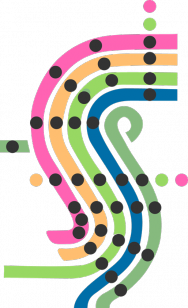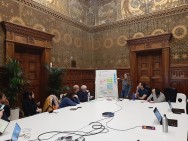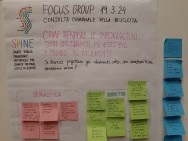- Home
- International relations and projects
- Conclusion of the SPINE project focus groups
Conclusion of the SPINE project focus groups
On March 27, a series of three focus groups concluded, which saw the participation of the Municipal Councils for overcoming disabilities, fighting social exclusion, and promoting bicycles, along with the Diversity Team of the Municipality of Bologna. The focus groups, an integral part of the initial phase of the SPINE project, actively involved representatives from local communities, mobility sector experts and public officials. Their aim was to gather feedback and ideas to develop innovative solutions for a more sustainable, accessible and inclusive mobility in Bologna.
The SPINE project aims to create a network of smart and sustainable public transport for European cities, contributing to efforts to achieve climate neutrality by 2030. Bologna, as a pilot city along with Antwerp, Tallinn and Las Palmas, plays a key role in developing innovative solutions to address the challenges of future urban mobility.
Among the project's actions, in support of what is outlined in the metropolitan PUMS, there is a substantial reconsideration of "Multimodal Hubs," railway stations that play a dynamic role in the urban context where mobility paths intersect. This is aimed at creating a vital network of connections, transforming non-places into places capable of supporting a mindset shift towards increased sustainable and intermodal mobility, at the expense of private car usage.
During the focus groups, citizens were called upon to rethink these spaces, particularly three of the stations where interventions will be made with project resources: Casteldebole, Corticella and Mazzini. Based on the experiences of the selected target groups, numerous insights and proposals emerged. Among these, the evident need to enhance pedestrian and cycling connectivity around the Multimodal Hubs, to facilitate users' movements and promote the use of bicycles as a sustainable means of transport, as well as to make access to transportation and the use of the stations themselves more comfortable for people with disabilities.
The success of the focus groups was made possible thanks to the collaboration between the Municipality of Bologna, SRM - Networks and Mobility (partners of the SPINE project) and the Foundation for Urban Innovation. Thanks to these feedbacks and proposals from the local community, the project now moves on to the next phase, focusing on the implementation of identified solutions; in this process, some co-design workshops will also be held with schools located near the identified Multimodal Hubs, aiming to raise awareness among students and their families about a more inclusive and sustainable mobility in Bologna.
Ultimo aggiornamento: mercoledì 17 aprile 2024








